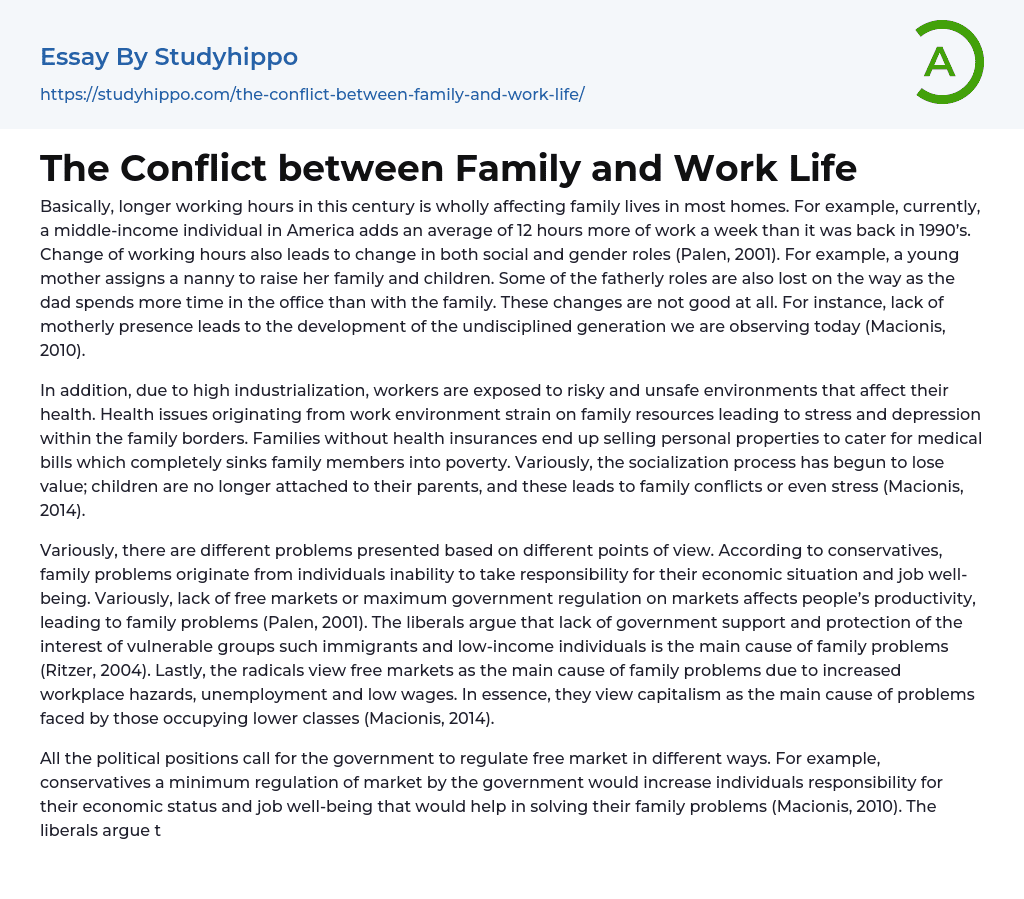In conclusion, the 21st century has greatly influenced family life due to longer working hours. In the United States, individuals with middle-income now dedicate approximately 12 more hours per week to work compared to the 1990s. Consequently, social and gender roles have undergone transformations. Mothers, for instance, are increasingly employing nannies to look after their families and children while fathers prioritize spending time in their workplaces rather than with their families. Unfortunately, these alterations have led to adverse consequences.
One example of this is the absence of a maternal figure, which is resulting in the formation of today's unruly generation (Macionis, 2010). Furthermore, the extensive industrialization has led to workers being exposed to dangerous and hazardous environments that impact their well-being. These health problems, originating from the workplace, put pressure on family resources and ultimately generate stress and depression within the househo
...ld (Macionis, 2014). Families lacking medical insurance resort to selling personal possessions to cover medical expenses, leading them into poverty. Additionally, the significance of the socialization process has diminished as children grow increasingly distant from their parents. These factors contribute to familial conflicts and added strain (Macionis, 2014).
According to various perspectives, different problems arise. Conservatives believe that family problems stem from individuals' failure to take responsibility for their economic situation and job well-being. This is often attributed to the lack of free markets or excessive government regulation on markets, which hampers productivity and leads to family problems (Palen, 2001). In contrast, liberals argue that family problems primarily arise from the lack of government support and protection for vulnerable groups such as immigrants and low-income individuals (Ritzer, 2004). Lastly, radicals attribute family problems to free markets
as they result in increased workplace hazards, unemployment, and low wages.
In summary, critics attribute the challenges faced by those in lower socioeconomic classes to capitalism (Macionis, 2014). Various political factions advocate for different degrees of government regulation of the free market. Conservatives propose minimal regulation, which would foster individual responsibility for economic status and job satisfaction, thereby addressing family issues (Macionis, 2010). Liberals advocate for government assistance through job training, healthcare, education, and decreased taxation as the most effective means of reducing family problems (Ritzer, 2004). Finally, radicals assert that prioritizing people's needs over profits requires abolishing the capitalist economic system to resolve familial challenges (Macionis, 2014).
The definition of family units has changed over time due to shifts in socialization and community values. Previously, families were traditionally seen as a union of one or both parents and their children living together and providing mutual care. However, modern society now has a more inclusive understanding of what constitutes a family. This expanded perception includes single parents raising children, families formed based on affinity, children being raised by married same-sex couples, or even married couples without children (Macionis, 2014).
Conclusion
The current societal changes we are witnessing can be attributed to the erosion of culture. With the arrival of the digitalized era, significant societal norms and values have been lost.
Advancements in technology have brought about changes in the way people socialize and the acceptance of different types of families. As a result, there has been an increase in crime rates and societal depression, along with a decline in traditional family love and unity. However, despite this ongoing revolution, it is important for parents to maintain cultural norms and values
as they can help address social problems (Palen, 2001).
References
- Macionis, J. J. (2010). Social problems. Boston: Prentice Hall.
- Palen, J. J.
(2001). Social problems for the twenty-first century. Boston: McGraw-Hill.
Macionis, John J. (2014).
Revel: For Social Problems. Pearson College Div.
- Ritzer, G. (2004). The McDonaldization of society.
Thousand Oaks, California: Pine Forge Press.
- Adoption essays
- Aunt essays
- Babies essays
- Bedroom essays
- Caring essays
- Children essays
- Daughter essays
- Divorce essays
- Dog essays
- Dysfunctional Family essays
- Family Tradition essays
- Family Values essays
- Father essays
- Foster Care essays
- Friends essays
- Grandparent essays
- Home essays
- Hometown essays
- Husband essays
- Jealousy essays
- Love essays
- Marriage essays
- Mother essays
- Online Dating essays
- Parenting essays
- Parenting Teens essays
- Parents essays
- Relationship essays
- Room essays
- Sibling essays
- Sister essays
- Wedding essays
- Wife essays
- Belief essays
- Deontology essays
- Ethical dilemma essays
- Moral essays
- Normative Ethics essays
- Values of Life essays
- Virtue essays
- Virtue Ethics essays
- Work Ethic essays




